Intel NUC 8 VR (NUC8i7HVK) Review: Core i7, AMD Vega Meet in Hades Canyon
Why you can trust Tom's Hardware
AotS: Escalation, Civilization VI, Dawn Of War III
| NUC 8 VR NUC8i7HVK | NUC 8 VR Stock | GPU 1350 MHz (HBM 800) | GPU 1350 MHz (HBM 900) | CPU 4.2 GHz (GPU Stock) | CPU 4.2 GHz (1250/900) |
| Core i7-8809G | Stock | Stock | Stock | 4.2 GHz All-Core (1.05V) | 4.2 GHz All-Core (1.05V) |
| Vega Graphics | Stock | 1350 MHZ (1.1V) | 1350 MHz (1.1V) | Stock | 1250 MHz (1V) |
| HBM2 | Stock | 800 MHz (1.1V) | 900 MHz (1.1V) | Stock | 900 MHz (1V) |
| System Memory | Stock | Stock | Stock | DDR4-3200 | DDR4-3200 |
The NUC 8 VR offers a wealth of tunable parameters, including CPU, GPU, HBM2, and system memory overclocking. Our stable configurations were detailed on the previous page; this table simply serves as a reminder as you peruse our results. If you aren't interested in overclocked performance, simply focus on the "VR NUC Stock" entry.
Ashes Of The Singularity: Escalation
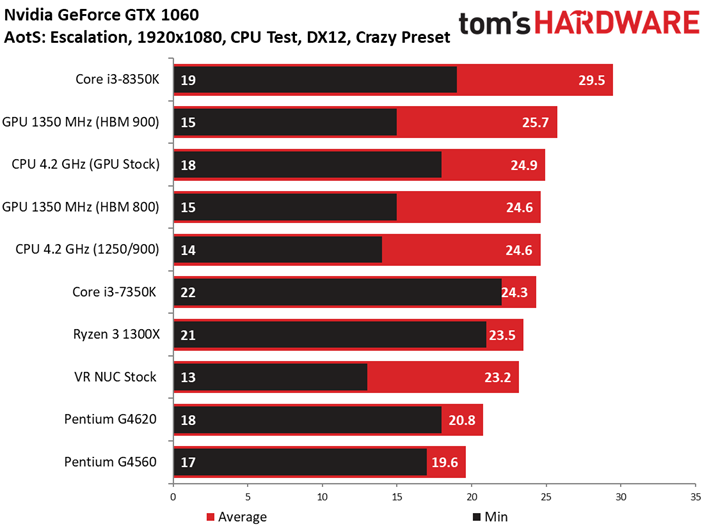
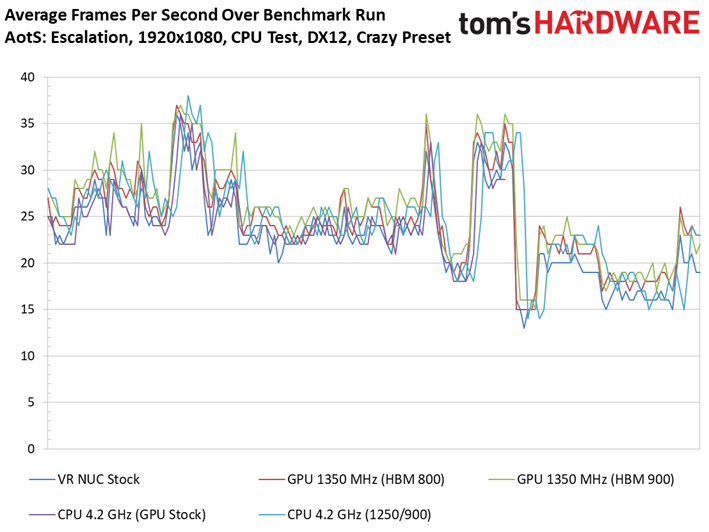
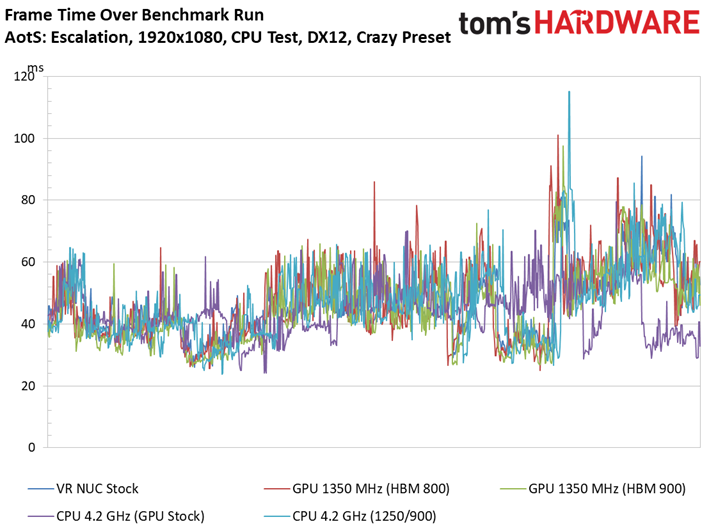
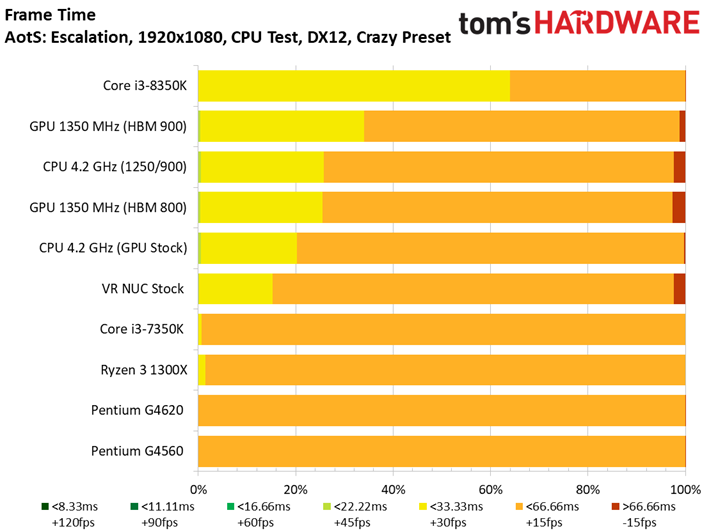
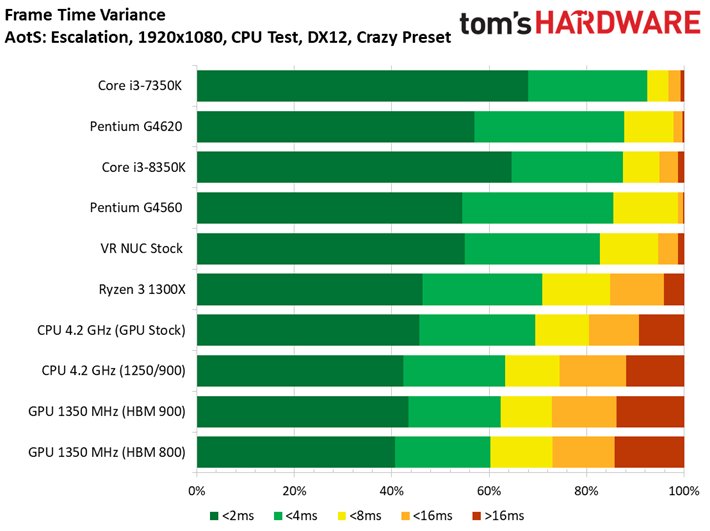
Ashes of the Singularity: Escalation isn't very popular with gamers anymore, yet it is still widely used as a benchmark. That's because it relies heavily on host processing and still taxes the graphics subsystem. It serves as a solid example of the RTS genre, making it a great test for our NUC 8 VR overclocking experiments.
The 4C/8T stock NUC unsurprisingly jumps ahead of the 2C/4T Pentiums paired with GeForce GTX 1060 add-in cards. Tuning the NUC's GPU yields the largest speed-up in Ashes, even though we're looking at fairly small jumps overall. Granted, we're testing with maxed-out detail settings.
You'd probably want to play the game with its quality preset dialed back a couple of notches anyway. Notice that the NUC has a lower minimum frame rate than the competing setups. Although minimums only reflect the single lowest performance point, our frame time variance results confirm that Kaby Lake-G encounters more turbulence through our benchmark than the full-size desktops.
Civilization VI Graphics
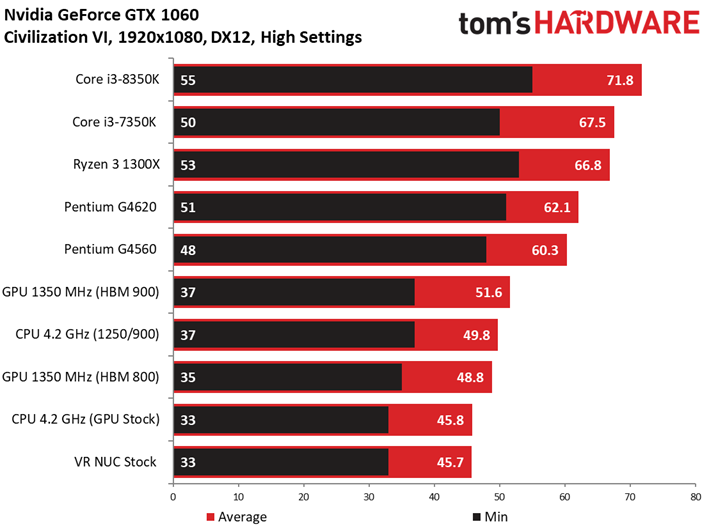
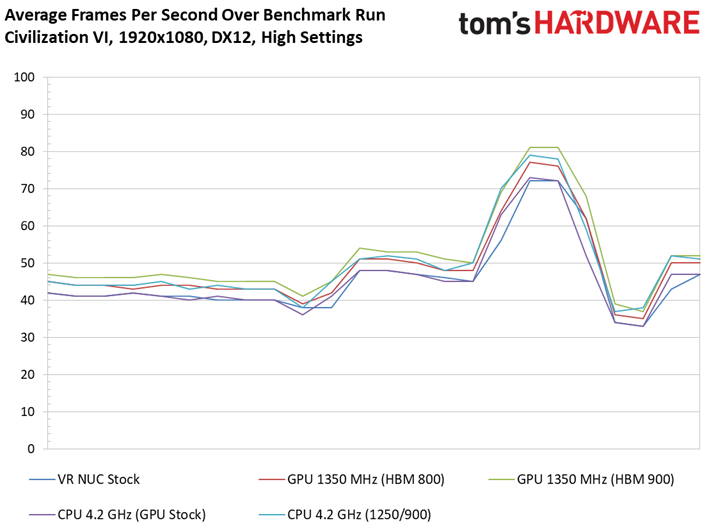
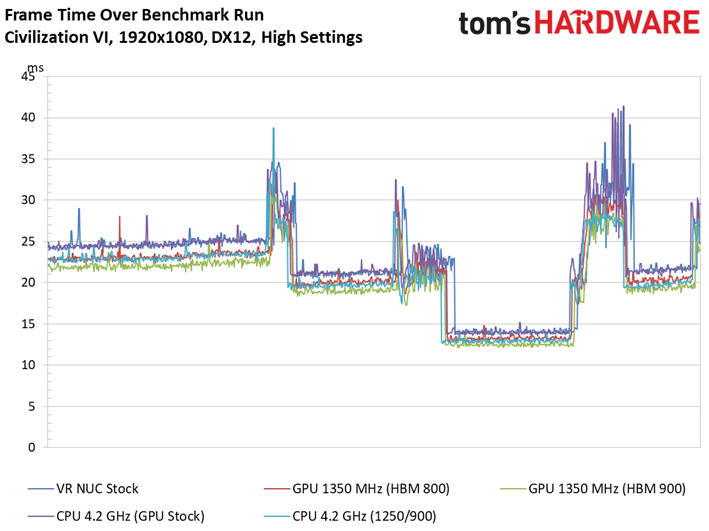
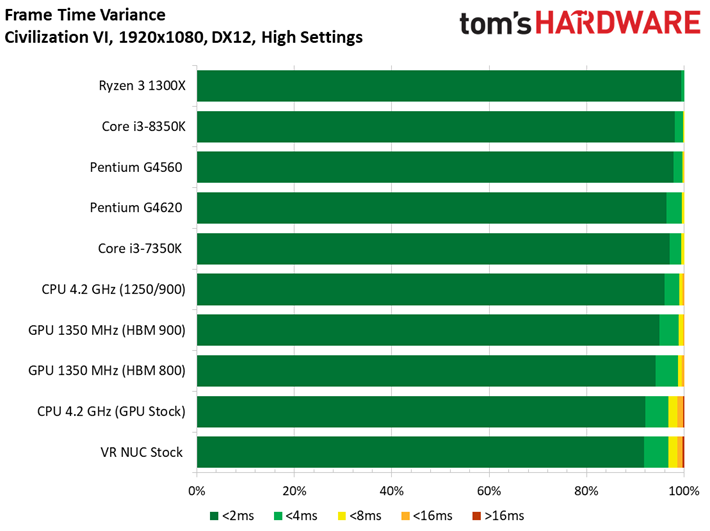
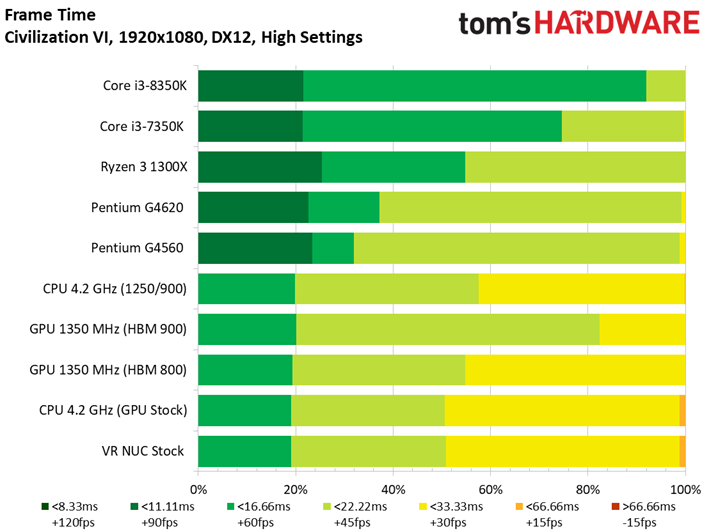
Civilization exposes more separation between mobile- and desktop-class host processors than Ashes did. And yet, the biggest gains in this benchmark come from overclocking the NUC's graphics processor and HBM2. Tuning the CPU's four cores up to 4.2 GHz does very little to help.
Dawn Of War III
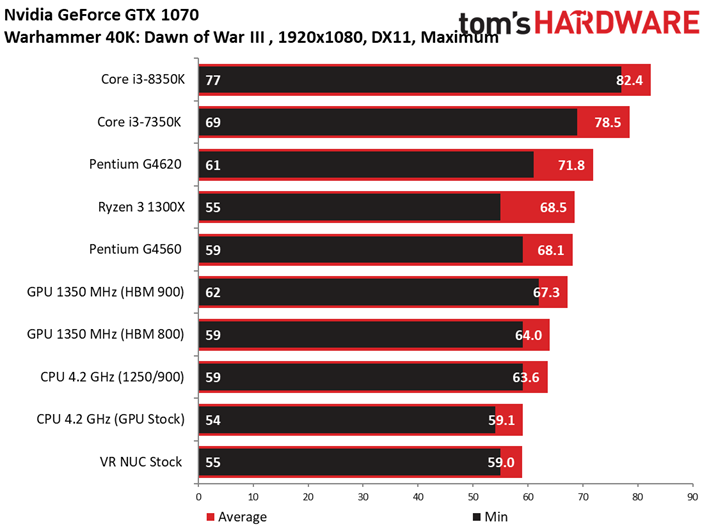
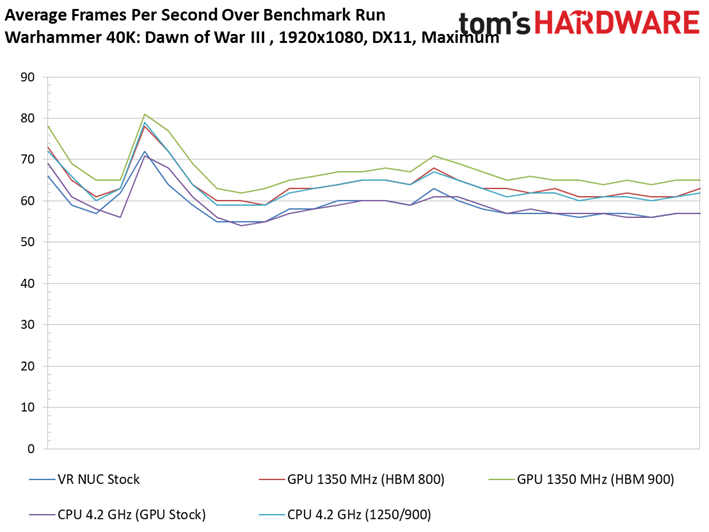
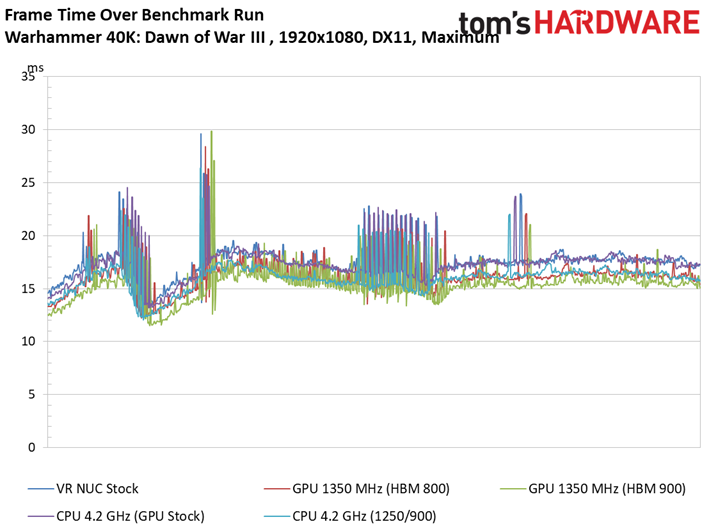
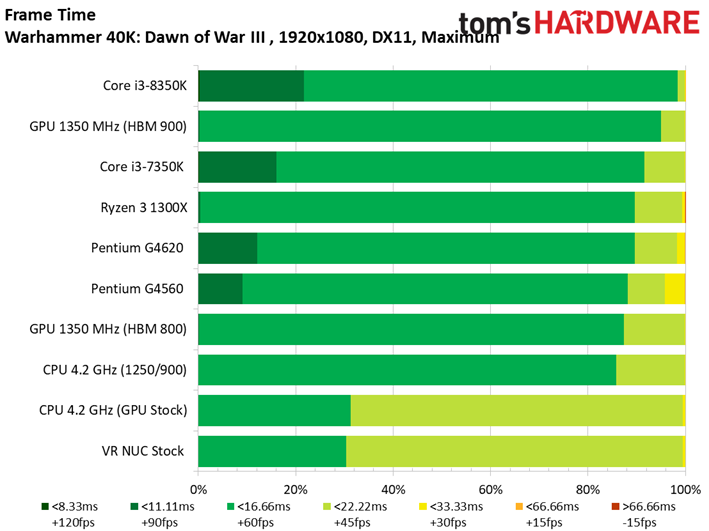
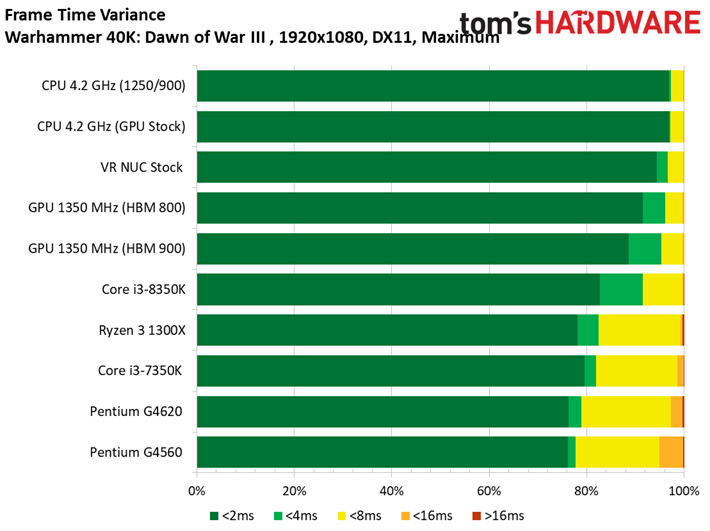
Each game behaves differently, depending on its bottleneck. In general, though, higher GPU frequencies and more memory bandwidth improve performance in most games played at 1920x1080 or higher. On its own, an overclocked host processor just doesn't move the bar in Dawn of War III.
It is impressive to see Intel's NUC 8 VR at least approach the level of a desktop CPU and add-in mainstream graphics card. Then again, the GeForce GTX 1060 clearly has room to stretch when it's paired up with more capable host processors (as evidenced by the difference between our Pentium G4560 and Core i3-8350K frame rates).
Get Tom's Hardware's best news and in-depth reviews, straight to your inbox.
MORE: Best PC Builds
MORE: How To Build A PC
MORE: All PC Builds Content
Current page: AotS: Escalation, Civilization VI, Dawn Of War III
Prev Page Overclocking & Test Setup Next Page Far Cry Primal, GTA: V, Hitman
Paul Alcorn is the Editor-in-Chief for Tom's Hardware US. He also writes news and reviews on CPUs, storage, and enterprise hardware.
-
AgentLozen I would liked to have seen it compared to the 1050Ti also. I imagine that the Intel 8809GH performs right between the two of them but I would like to see the benchmarks just to be sure.Reply
For $1000, how much do you get with this box? A case, power supply, motherboard, GPU, and CPU. You need to supply several hundred dollars in components to finish it off. The performance is decent, but not great compared to a i3 8350K + GTX 1060. So what advantage does this offer over building your own MicroATX computer?
You could argue that graphics cards are over priced right now but what happens when they come down in price? The NUC8i7HVK would be REALLY cool if the final price of a complete system was $1000, but I feel like it doesn't offer enough as it is right now. -
Gigahertz20 I've built two Intel NUC's for family members in the past couple of years and they love them. Fast, quiet and so far reliable. They don't game at all which is why I convinced them to buy them. I'm not sure if this NUC is going to be popular at all though at $1,000 barebones. Who is going to buy it? The gaming performance of this NUC is nothing special, gamers and enthusiasts are going to stick with desktops, alot of people are just waiting for the cryptocurrency craze to die down so we can get video cards at decent prices again. If that takes another year or 2 so be it.Reply
Your average person that just needs an office computer won't buy this at $1k, you can get a much cheaper NUC and throw in a SSD and that will work fine. Why pay a premium for a cute little powerful box, if you want small and portable you can get a laptop for cheaper. If they would have priced this at $600 barebones it would have been much more appealing to your average user that might want to play the occasional game at 1080P. -
Eximo There are i7-7700HQ laptops with GTX1060 for comparable prices.Reply
Great product, pricing is just too off to make sense. For this money I would look at ASRock's STX form factor. -
bit_user Reply
Except:20839276 said:Should the dedicated gpu be a 1030 or 1050, not a 1060.
Intel claims its new chips should serve up similar graphics performance as Nvidia's GeForce GTX 1060 Max-Q.
However:
Test System & ConfigurationGigabyte GeForce GTX 1060 G1 Gaming 6G
So, it seems the legit complaint is that they used a standard GTX 1060, instead of something closer to the Max-Q model. Here's how they compare:
http://gpuboss.com/gpus/GeForce-GTX-1060-Max-Q-vs-GIGABYTE-GeForce-GTX-1060-G1-Gaming
I think the Quadro P2000 would be pretty close to the GTX 1060 Max-Q:
https://www.nvidia.com/content/dam/en-zz/Solutions/design-visualization/documents/Quadro-P2000-US-03Feb17.pdf
But, it's not a perfect match, and it would make for a slightly awkward comparison, probably raising more fuss than the card they chose. Still, they should've at least used a slower GTX 1060, like one of the ITX-friendly single-fan cards. -
bit_user Reply
... something about equating desktop and laptop GPUs.20839877 said:You can get a laptop with a 1060 for around $1000 all-in. It costs even less for a 1050ti which I agree seems closer in performance. -
zodiacfml Glad to see products though I want to see even more such as integrated RAM.Reply
I wonder how AMD APUs would fare with HBM memory available to its CPU and GPU. -
FD2Raptor Reply20839276 said:Should the dedicated gpu be a 1030 or 1050, not a 1060.
The dedicated comparison should have been the RX 570/580 4GB GDDR5 to remove any nvidia vs amd optimizations difference from the equation. -
redgarl The GPU is really similar to a RX 570. Well, it is impressive for an IGPU. I am surprised AMD is not doing anything for that market on mobile.Reply
Probably next year with Zen 2.
20841016 said:20839276 said:Should the dedicated gpu be a 1030 or 1050, not a 1060.
The dedicated comparison should have been the RX 570/580 4GB GDDR5 to remove any nvidia vs amd optimizations difference from the equation.
I totally agree. As of now it is impossible to know what this VEGA 11 chip really is in comparison to APU.